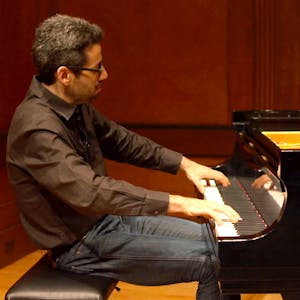Welcome to Exploring Beethoven's Piano Sonatas Part 5! This course delves into the intricate world of Beethoven's piano sonatas, providing a comprehensive analysis of Op. 27, No. 1, Op. 31, No. 1, and Op. 106: Hammerklavier. Through engaging modules, learners will gain insight into the unique characteristics and historical significance of each sonata, enhancing their appreciation for Beethoven's genius.
Throughout the course, participants will explore the lesser-known aspects of these masterpieces, uncovering the structural innovations, harmonic complexities, and emotional depth embedded within Beethoven's compositions. With discussions, quizzes, and insightful commentary, this course encourages active engagement and critical thinking, fostering a vibrant learning community. Whether you're a music enthusiast, pianist, or simply curious about classical music, this course offers a captivating journey into the world of Beethoven's piano sonatas.
Certificate Available ✔
Get Started / More Info
Embark on an in-depth exploration of Beethoven's Piano Sonatas, including Op. 27, No. 1, Op. 31, No. 1, and Op. 106: Hammerklavier. Gain insight into each composition's unique characteristics, structural innovations, and historical significance.
Welcome to Class
This module provides an introduction to the course, guiding learners through the structure and content they will encounter in the subsequent modules. By familiarizing themselves with the course site and assignments, participants can effectively prepare for the learning journey ahead.
Op. 27, No. 1
Op. 31, No. 1
Op. 106: Hammerklavier (Part 1)
Op. 106: Hammerklavier (Part 2)
Your Thoughts Welcome
This module encourages learners to share their insights and reflections on the course material, fostering a collaborative and interactive learning environment. By engaging in discussions, participants can deepen their understanding and contribute to the vibrant learning community.
A Voice of Their Own. Women's Spirituality in the Middle Ages is a captivating exploration of the pivotal role women played in medieval spirituality, delving into...
Roman Art and Archaeology offers a comprehensive exploration of ancient Rome's culture, spanning from its early origins to the fall of the Roman Empire, providing...
This course offers a global perspective on modern history, exploring pivotal moments and choices that have shaped the world since 1910.
This course delves into William Shakespeare's classic comedy, Twelfth Night, exploring its language, characters, humor, and enduring relevance in a contemporary...